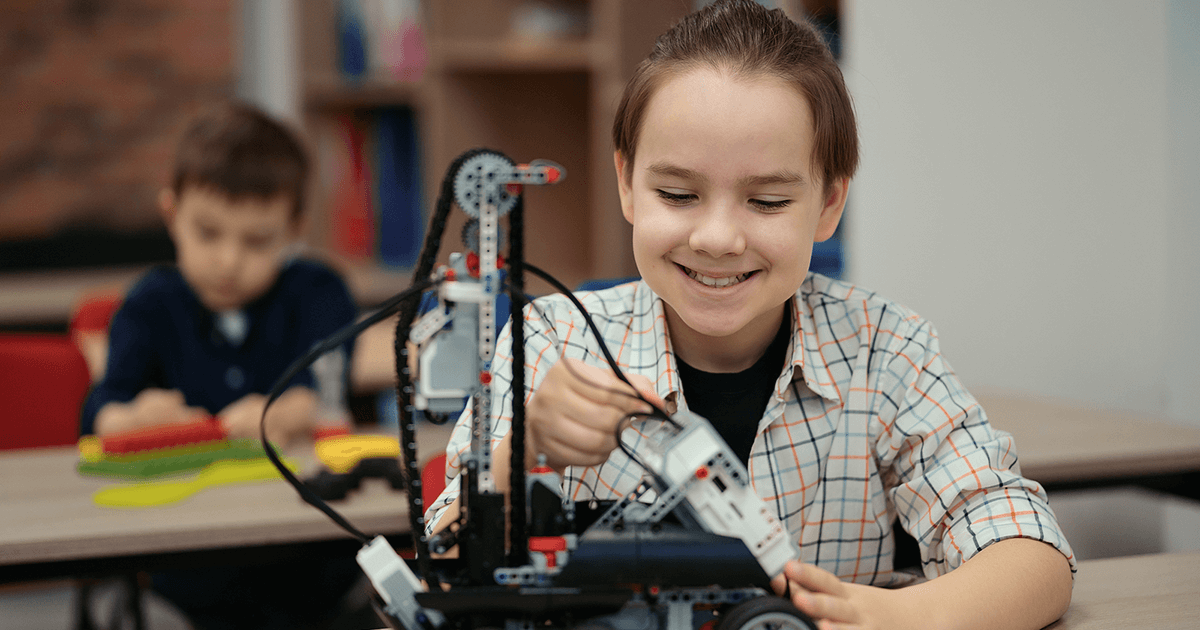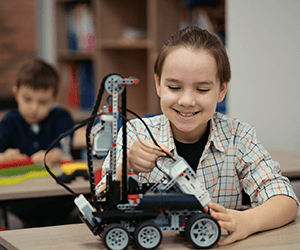You’ve likely heard the term, but you may still be wondering: What is a makerspace? Makerspaces are, quite simply, spaces where people can make things. A makerspace can be as small as a table and some storage bins or as large as a dedicated building. A makerspace might have simple materials like paper, pipe cleaners, and cotton balls, or it could feature high-tech items like 3D printers and robot parts.
No matter what size your makerspace is or what materials it has, it’s a great place for learning. The National Inventors Hall of Fame® says that makerspaces in schools “are designed to challenge students to create and learn through hands-on, personalized experiences throughout elementary, middle, and high school.”1 The International Society for Technology in Education (ISTE) says that making meets numerous ISTE Standards, including Empowered Learner, Innovative Designer, Computational Thinker, and Creative Communicator.2 Discover five reasons why makerspace learning environments should be part of your teaching strategy.
- Makerspaces provide hands-on learning opportunities.
Students can learn concepts through books, lectures, and videos, but in a makerspace they have an opportunity to take an abstract concept and put it into practice. For instance, in a classroom kids can learn about electricity, but in a makerspace students can make a paper circuit and create a holiday card that lights up. - Makerspaces teach kids resilience.
Creative spaces give kids an opportunity to use various tools and materials. As they tinker, students analyze what’s working and what’s not, and they have to try different tactics to solve problems. Through this process, kids learn to experiment, accept failures, make improvements, and develop the resiliency they need to try and try again. - Makerspaces help kids build communication, creativity, and collaboration skills.
Team projects in makerspaces authentically create collaboration and communication. In order to create an item or complete a project, kids naturally communicate, contribute ideas, and take on tasks—which helps them build those 21st-century skills of collaboration, creativity, and communication. - Makerspaces encourage educational equity.
Makerspaces help introduce students to engineering, computer science, robotics, and other sciences that traditionally have been the purview of white males. In a makerspace, girls, students of color, neurodiverse learners, English language learners, and students of any socioeconomic background can access the same tools and technology that once may have been available only to students in gifted programs or in robotics clubs. - Makerspaces could help kids do better in school.
Students who are engaged learners are more likely to attend school and graduate. Schools like Elizabeth Forward Middle School in Elizabeth, Pennsylvania, consider their makerspaces a factor in improved test scores and decreased dropout rates.3
Makerspaces have transformed education. If you want to become a teacher who embraces new trends and technology, consider earning your teaching degree from an accredited university that has been at the forefront of distance education: Walden University. In 1970, two educators were inspired to create opportunities for working professionals where there previously were none. That’s how Walden was born. Ever since, it has helped reshape access to high-quality education. Today, Walden is a leader in online education. Thanks to its flexible online learning platform, you can continue to work while pursuing your online teaching degree. And you can complete your coursework at whatever time of day works best for you.
If you haven’t yet earned a teaching degree, you can pursue a bachelor’s in elementary education at Walden. A BS in Elementary Education can prepare you to become a kindergarten teacher or an elementary school teacher for grades 1–6. And the BS in Elementary Education online is part of Walden’s Richard W. Riley College of Education and Human Sciences, which is accredited by the Council for the Accreditation of Educator Preparation (CAEP), the sole nationally recognized accrediting body for educator preparation. You’ll learn how to create impactful instruction as a new elementary school teacher. Prepare to sit for your state’s teacher licensure exam and make a meaningful difference in the lives of your students when you earn your BS in Elementary Education (Teacher Licensure) at Walden.
Walden University is an accredited institution offering a BS in Elementary Education degree program online. Expand your career options and earn your degree in a convenient, flexible format that fits your busy life.
1Source: www.invent.org/blog/trends-stem/benefits-makerspace
2Source: www.iste.org/explore/In-the-classroom/The-maker-movement-A-learning-revolution
3Source: medium.com/remake-learning-playbook/transforming-a-school-district-one-classroom-at-a-time-5ef56b836067
Accreditation
Walden University’s Richard W. Riley College of Education and Human Sciences is accredited based on the Council for the Accreditation of Educator Preparation (CAEP) Standards through June 2026. This accreditation covers specific Walden initial teacher and advanced educator preparation programs, including the BS in Elementary Education, Master of Arts in Teaching (MAT) – Special Education specialization, MS in Education – Educational Leadership and Administration specialization, and EdS in Educational Leadership and Administration. The MAT-SPED, MSED-ELA, and EdS-ELA programs were reviewed by Specialized Professional Associations (SPAs), which define content-area standards for programs, and achieved national recognition.
CAEP promotes excellence in educator preparation through quality assurance and continuous improvement. Walden’s College of Education and Human Sciences has earned national accreditation by demonstrating excellence in the areas of content and pedagogy, clinical experiences, selectivity, program impact, and capacity for continuous improvement. CAEP is a Council for Higher Education Accreditation (CHEA) – recognized national accreditor for educator preparation.
Licensure
Walden is approved by the Minnesota Professional Educator Licensing and Standards Board (PELSB) to offer a program leading to a Minnesota Tier 3 license in Elementary Education. All candidates must pass the required Minnesota Teacher Licensure Exams (MTLEs) in order to complete the program. Candidates seeking licensure in Minnesota are responsible for completing any other Minnesota requirements beyond Walden’s state-approved program. The Minnesota Professional Educator Licensing and Standards Board (PELSB) is solely responsible for reviewing applications and issuing licenses.
Individuals interested in licensure in states other than Minnesota may qualify by virtue of completing a state-approved educator preparation program; however, individuals must review their state’s regulations to ensure the program meets all requirements, paying particular attention to any requirements specific to out-of-state program completers. Individuals who reside in certain states may be ineligible to enroll in this program. Walden Enrollment Specialists can provide guidance on licensure questions; however, it remains the individual’s responsibility to understand and comply with all state licensure requirements. Walden makes no representation or guarantee that completion of Walden coursework or programs will permit an individual to obtain state licensure.
Prospective Alabama students: State authorization to provide a program related to the preparation of teachers or other P–12 school/ system personnel does not indicate eligibility for an Alabama professional educator or professional leadership certificate. Applicants who complete an educator preparation program at a non-Alabama institution must apply for an Alabama professional educator or professional leadership certificate through the Alabama Certificate Reciprocity Approach. Current requirements may be found at www.alsde.edu.
Walden University is accredited by The Higher Learning Commission, www.hlcommission.org.





